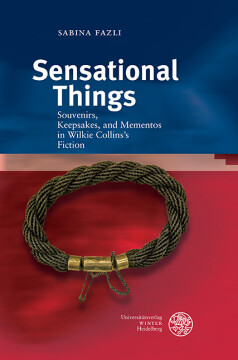
BUCH
Sensational Things
Souvenirs, Keepsakes, and Mementos in Wilkie Collins’s Fiction
Anglistische Forschungen, Bd. 464
2019
Zusätzliche Informationen
Bibliografische Daten
Abstract
In the Victorian sensation novel, things that bear witness to secrets, guilt, and past crimes proliferate. These pieces of evidence often belong to the category of the keepsake and come in the shape of jewels, textiles, or conserved fragments of cloth, hair, or paper, forming part of the novel’s object world. This study examines how Wilkie Collins’s successful sensational plots are entwined with the histories and properties of the small, overlooked objects that bring past events into the present. It offers readings of Collins’s texts that adapt concepts from material culture studies and brings them to bear on literary analysis. The readings thus complement approaches based on gender, race, and contemporary medical discourses current in scholarship on Collins and integrates them with perspectives on keepsakes as a productive class of things in Victorian sensation fiction.
Inhaltsverzeichnis
| Zwischenüberschrift | Seite | Aktion | Preis |
|---|---|---|---|
| Cover | Cover | ||
| Titel | III | ||
| Imprint | IV | ||
| Acknowledgements | V | ||
| Contents | VII | ||
| List of Abbreviations | IX | ||
| Illustrations | XI | ||
| Fig. 1 Frame and nested narratives in „After Dark“ and dates of first publication | 47 | ||
| Fig. 2 Nineteenth-century domestic memorial made from hair | 78 | ||
| Fig. 3 Cover of the 1871 Smith, Elder yellowback edition of „The Dead Secret“ | 122 | ||
| Fig. 4 Chantal Powell, Something She Once Said (2010) | 237 | ||
| Fig. 5 Cover of the 1999 edition of Sarah Waters’s „Affinity“ | 240 | ||
| 1 Introduction | 1 | ||
| 1.1 Material Culture Studies | 14 | ||
| 1.2 Victorian Material Culture: “Object lessons” at the Crystal Palace and at Home | 22 | ||
| 1.3 Overview of Criticism: Material Culture and Victorian Literature | 30 | ||
| 1.4 Sensation Fiction and Keepsakes | 37 | ||
| 2 “the most casual notice […] of some very unpromising object”: Keepsakes as “narrative-matter” in „After Dark“ | 45 | ||
| 2.1 “I resolved to imitate the French author”: Discovering Things | 48 | ||
| 2.2 Metonymic Objects | 56 | ||
| 2.2.1 “I should like it put into my portrait, sir”: Framed Keepsakes | 58 | ||
| 2.2.2 “The owner of these possessions lived in the bygone time”: The Past as Collection | 60 | ||
| 2.2.3 Curiosities | 65 | ||
| 2.3 Metonymic Objects as Telling Things | 67 | ||
| 3 “I’ve got a design against all your heads”: Connecting and Collecting Hair in „Hide and Seek“ | 69 | ||
| 3.1 Strong Metonymic Reading and the Biography of Things | 71 | ||
| 3.2 Victorian Hair in „Hide and Seek“ | 75 | ||
| 3.2.1 The Hair Market and the “Traffic” in Hair | 80 | ||
| 3.2.2 Mary’s Hair Bracelet: A Biography | 83 | ||
| 3.2.3 Scalps, Scalping, and Head Hunting | 92 | ||
| 3.3 “the Samson of Kirk Street”: Mat as Detective | 102 | ||
| 3.4 The Scalp and the Hair Keepsake as Uneasy Twins | 106 | ||
| 4 “Let these trifles speak for her”: Keepsakes and the Letter as Bequests in „The Dead Secret“ | 109 | ||
| 4.1 Reading/Writing the Letter and ‘Touching’ Things | 112 | ||
| 4.1.1 Hidden Letters and Buried Writing in Collins’s Fiction | 112 | ||
| 4.1.2 Sarah Leeson Among Things | 116 | ||
| 4.1.3 Hands and Touch in the Characterisation of Sarah Leeson | 126 | ||
| 4.2 Recording the Secret | 129 | ||
| 4.2.1 The Writing of the Letter | 129 | ||
| 4.2.2 Sarah Leeson’s Collections | 131 | ||
| 4.3 The Letter and Things as Media of Transmission | 148 | ||
| 5 “Suspicious circumstances have not been investigated”: Hair Keepsakes and Photography in „The Law and the Lady“ | 151 | ||
| 5.1 “How comes the teacup to be broken?”: Things as Evidence | 154 | ||
| 5.2 “disinterring the Major’s treasures”: The Search of the Room | 159 | ||
| 5.2.1 The Album | 160 | ||
| 5.2.2 Hair Souvenirs and Photographs | 163 | ||
| 5.3 The Context of Carte-de-Visite Photography | 167 | ||
| 5.3.1 “There was the original”: The Photograph and Identification | 167 | ||
| 5.3.2 The Carte as Reproducible Image | 168 | ||
| 5.3.3 The Carte as a ‘Device of Truth’ | 171 | ||
| 5.4 Keepsakes as Modern Materials and Sensational Affect | 175 | ||
| 5.4.1 The Material of “the new age ” | 175 | ||
| 5.4.2 The Hair Keepsakes, Affect, and Infection | 181 | ||
| 5.5 Detection and Affect in Hair Mementos and Photographs | 187 | ||
| 6 “the last relic of Mary”: The Keepsake and the Body in „The Two Destinies“ | 189 | ||
| 6.1 “Disguised from each other”: The Problem of Remembrance | 195 | ||
| 6.2 Memory and ‘Recognition’ in Things | 204 | ||
| 6.2.1 “Do you prize that toy?”: The Material and Meaning of the Green Flag | 204 | ||
| 6.2.2 Framing the Souvenirs’ “influence” | 213 | ||
| 6.3 “The old wound opens again”: The Body and Remembering | 221 | ||
| 6.4 Distributed Remembrance | 227 | ||
| 7 Sensational Things | 231 | ||
| 8 Works Cited | 243 | ||
| Backcover | 260 |


 Publishing Platform by CloudPublish
Publishing Platform by CloudPublish